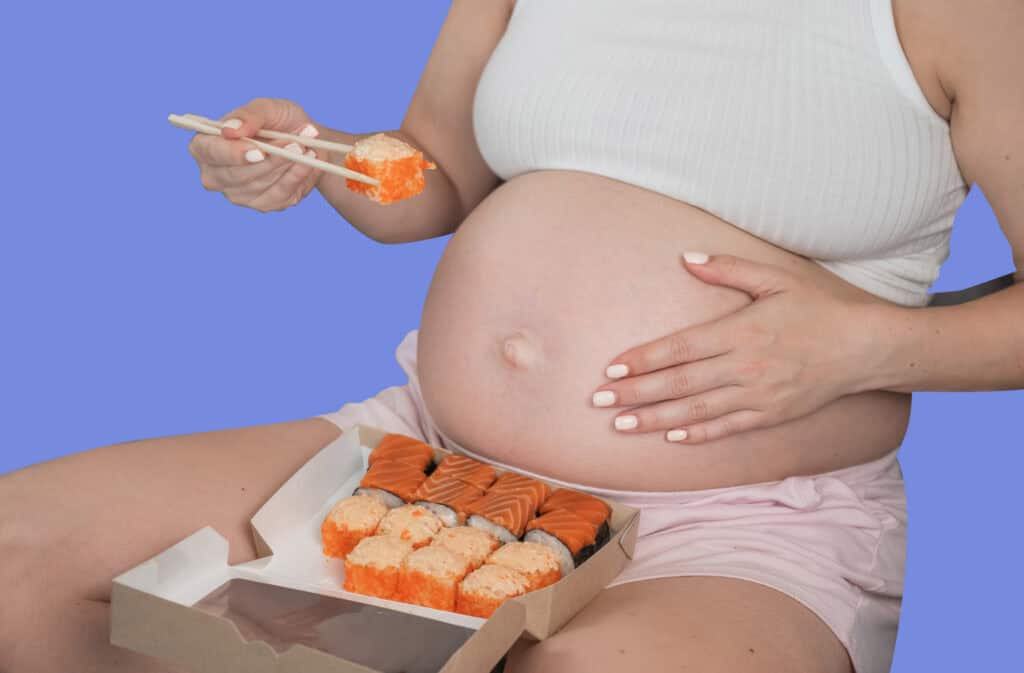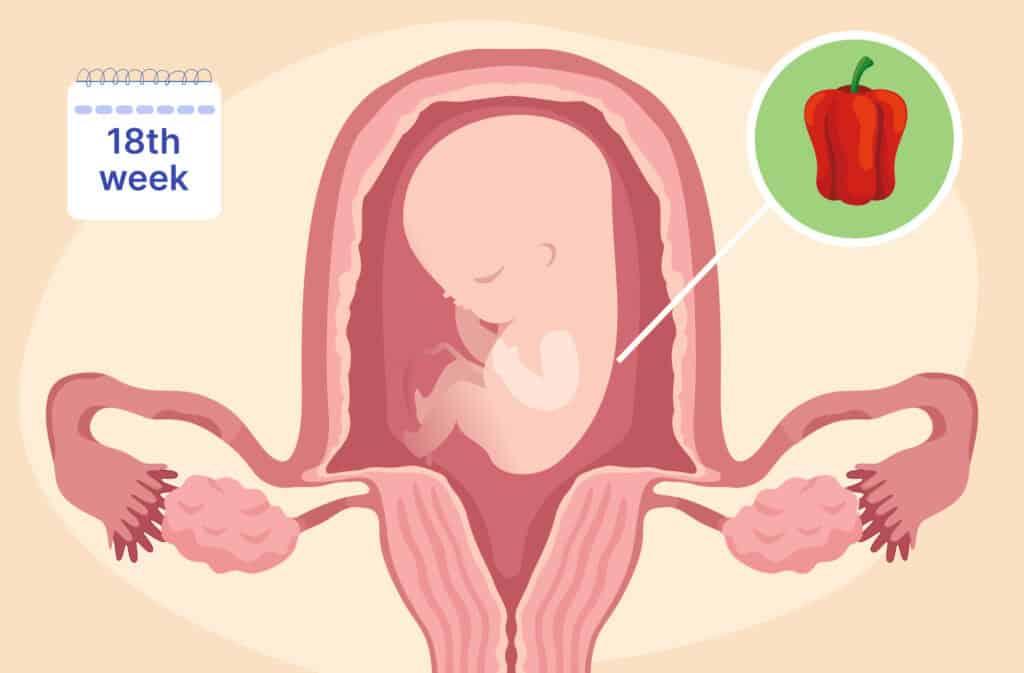Femia > Health Library > Pregnancy > Pregnancy health > Can pregnant women eat sushi? What you need to know about sushi during pregnancy
Can pregnant women eat sushi? What you need to know about sushi during pregnancy

- Updated Feb 10, 2025
- Published
CRAFTED BY HUMAN
Crafted by human At Femia, we provide accurate and up-to-date information at every stage of your journey, from trying to conceive, pregnancy and postnatal support. All content is created by a real person based on in-depth research and own professional experience. Femia ensures that you will receive expert advice, strict accuracy and a personalized approach from our authors/medical experts. Learn more about our editorial policy.
FACT CHECKED
Fact checked At Femia Health, we maintain the highest standards of editorial excellence in delivering content focused on helping you conceive, guiding you through pregnancy, and supporting you postpartum. Explore our content review principles to learn how we ensure the accuracy and quality of our health and lifestyle tips for every stage of your journey.
Pregnant women should avoid sushi containing raw fish to prevent the possibility of foodborne illnesses, such as listeria and parasites. Cooked sushi options, like shrimp tempura or eel rolls, and vegetarian sushi are safe alternatives that can satisfy sushi cravings during pregnancy.
Pregnancy is a time of excitement and lots of questions—especially when it comes to food. If you’re a sushi lover, you might be wondering if it’s safe to indulge in your favorite rolls now that you’re expecting. The answer is a bit nuanced. While some types of sushi are off limits, others are perfectly safe for pregnant women. Here’s what you need to know about sushi during pregnancy and how to make the best choices for you and your baby.
designed just for you
Personalized meal plans, symptom tracking, and more with the Femia
Can pregnant women eat sushi?
The short answer is “yes,” but with some important restrictions. While sushi is a healthy and delicious meal, the risk lies in the raw fish typically used in many popular rolls. During pregnancy, your immune system is slightly weakened, making you more susceptible to foodborne illnesses that can harm you and your baby. These illnesses can stem from bacteria or parasites found in raw fish, such as listeria, salmonella, and toxoplasma.
However, this doesn’t mean you need to give up sushi entirely. Cooked fish sushi, as well as vegetarian rolls, are safe to eat and can still satisfy your sushi cravings.
👉Find out more: Which food can cause miscarriage: A comprehensive guide
Why can't pregnant women eat sushi?
The primary concern with sushi during pregnancy comes from raw fish. Raw or undercooked seafood can contain harmful bacteria and parasites that may cause serious infections. The most common risks include:
- Listeria: This bacteria can cause listeriosis, a rare but serious infection that is particularly dangerous during pregnancy. It can lead to miscarriage, premature birth, or stillbirth.
- Parasites: Raw fish may contain parasites like tapeworm that can invade your digestive tract. While unpleasant at any time, a parasitic infection during pregnancy can weaken your immune system and cause additional complications.
- High mercury levels: Certain fish commonly used in sushi, like tuna and swordfish, can have high levels of mercury, which can affect fetal brain development.
These infections are rare but can have severe consequences for pregnant women and their developing babies. Listeriosis, for example, is 20 times more likely to affect pregnant women.
In addition, it’s recommended that pregnant women avoid sushi with fish that contain high levels of mercury, even if it’s cooked.
Sushi during the first trimester: should you avoid it?
The first trimester is a critical time for fetal development, when your body is undergoing significant hormonal changes. Many healthcare providers recommend that you be especially cautious with what you eat during this time. Because your immune system is more vulnerable during pregnancy, the risk of contracting a foodborne illness from raw fish is higher during the first trimester. For this reason, it’s best to avoid raw fish sushi entirely during these early months.
In addition to protecting yourself from infections, you may also be experiencing nausea or food aversions during the first trimester. Opting for lighter, cooked sushi or vegetarian options can help you avoid discomfort while still enjoying sushi.
👉Find out more: Your pregnancy checklist: Week-by-week guide to preparing for baby
What sushi can I eat while pregnant?
Just because raw fish is off the table doesn’t mean you need to forgo sushi altogether. There are plenty of delicious and safe options for pregnant women. Here are some types of sushi you can safely enjoy:
- Sushi made with fully cooked fish: Rolls with cooked shrimp (ebi), crab (kani), eel (unagi), or other fully cooked seafood are safe to eat.
- Vegetarian or vegan sushi: Avocado rolls, cucumber rolls, and other veggie-based options are healthy and satisfying.
- Sushi with pasteurized ingredients: If you enjoy sushi with cream cheese or mayonnaise, ensure these ingredients are pasteurized. Most restaurant-grade products are, but it’s always good to double check.
Avoid sushi made with high-mercury fish like bluefin tuna, swordfish, and mackerel, even if it’s cooked. Too much mercury can affect your baby’s developing brain and nervous system.
What sushi can I eat while pregnant: pregnancy-safe sushi options
Now that you know what sushi to avoid during pregnancy, here are some safe options you can enjoy:
- Shrimp tempura rolls: The shrimp is fully cooked and crispy, making this a great choice.
- Avocado and cucumber rolls: A classic and safe veggie option that’s both creamy and refreshing.
- Eel rolls (unagi): Eel is always served cooked in sushi, making it a safe and delicious option.
- California rolls: Usually made with imitation crab (which is cooked), avocado, and cucumber, California rolls are a pregnancy-friendly sushi staple.
- Sweet potato rolls: A popular veggie sushi roll that’s both nutritious and filling.
👉Find out more: Understanding weight loss during pregnancy
Guidelines for dining out
If you’re dining out and craving sushi, it’s important to be cautious about where you eat and what you order. Here are some tips to keep in mind:
- Choose reputable restaurants: Opt for well-established sushi restaurants with high hygiene standards. Avoid places where raw fish may have been sitting out for extended periods.
- Stick to cooked and vegetarian options: When in doubt, order sushi made with cooked fish, like shrimp tempura rolls, or veggie rolls, like avocado or sweet potato. These are satisfying, safe, and commonly found on most menus.
- Ask questions: Don’t hesitate to ask the restaurant staff how the sushi is prepared. Ensure the fish is cooked, the ingredients are fresh, and anything dairy-based is pasteurized.
At home, you can enjoy store-bought sushi, but double check the labels to confirm that the ingredients are cooked and safe for pregnancy. If you make sushi at home, you‘ll have full control over the ingredients and preparation, ensuring everything is up to safety standards.
designed just for you
Personalized meal plans, symptom tracking, and more with the Femia
Eating sushi while pregnant: balancing cravings and safety
Pregnancy cravings are real, and if you’re a sushi fan, it’s normal to miss your favorite rolls. The good news is that with some modifications, you can still enjoy sushi while pregnant. Here’s how to make smart choices:
- Try cooked alternatives: Many traditional sushi rolls, like tempura rolls (cooked shrimp), teriyaki rolls (cooked chicken or beef), and veggie rolls, are safe to eat. These can help satisfy your sushi cravings without the risk of raw fish.
- Opt for imitation crab: Imitation crab, often used in California rolls, is made from cooked fish and is a safe option during pregnancy.
- Make sushi at home: If you love the process of making sushi, try creating your own pregnancy-friendly versions at home. Use fully cooked fish, pasteurized dairy products, and plenty of fresh vegetables for a safe and delicious meal.
The bottom line
Yes, you can enjoy sushi during pregnancy, as long as you followsome important guidelines. Avoid raw fish to protect yourself and your baby from foodborne illnesses. Stick to fully cooked fish, vegetarian rolls, and low-mercury seafood to enjoy sushi safely. If you have any concerns or questions about sushi or other foods during pregnancy, always consult your healthcare provider for personalized advice.
References
- American College of Obstetricians and Gynecologists. “Nutrition During Pregnancy.” ACOG, 2020, https://www.acog.org/womens-health/faqs/nutrition-during-pregnancy.
- American Pregnancy Association. “Mercury Levels in Fish.” American Pregnancy Association, 2021, https://americanpregnancy.org/healthy-pregnancy/nutrition/mercury-levels-in-fish/.
- Centers for Disease Control and Prevention. “Listeriosis.” CDC, 2018, https://www.cdc.gov/listeria/index.html.
- Mayo Clinic. “Pregnancy Nutrition: Foods to Avoid During Pregnancy.” Mayo Clinic, 2021, https://www.mayoclinic.org/healthy-lifestyle/pregnancy-week-by-week/in-depth/pregnancy-nutrition/art-20043844.
- U.S. Food and Drug Administration. “Food Safety for Pregnant Women.” FDA, 2017, https://www.fda.gov/food/people-risk-foodborne-illness/food-safety-pregnant-women.
- American Society for Reproductive Medicine. “Fertility and the Menstrual Cycle.” ASRM, 2015, https://www.asrm.org/topics/topics-index/fertility-and-the-menstrual-cycle/.

Learn to distinguish between gas bubbles and baby movements during pregnancy. Understand key differences, timing, and when to consult your doctor. Expert advice from Femia.

At 18 weeks pregnant, your baby is about the size of a bell pepper. Learn about week 18 symptoms, belly growth, and self-care advice.

Can you take antidepressants while pregnant? Find an all-encompassing guide to antidepressants and pregnancy with risks, tips, safe options, and more.

